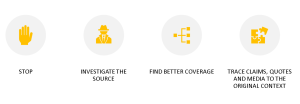10
Evaluating Web Sources
It’s important to evaluate everything you find, but especially important when you use the web to find your sources.
Using the “Four Moves” process from Mike Caulfield, you should be able to figure out more about a source and if you should be using it. When you find a source you should be fact checking it by doing these steps:
- Check for previous work- Has someone else already fact checked this?
- Go upstream to the source- Where does this claim come from originally? Check it out to see if you can figure out more information.
- Read laterally- After you found the original source, read more about the author, publication, etc. to see what people are saying about those.
- Circle back- In too deep? Can’t find exactly what you need? Start back up again taking what you’ve learned and try another source or search.

Check out the Web Literacy for Students Fact Checkers by Mike Caulfiled
Evaluating Library Sources
Just because you found a resource on the library website doesn’t mean you can and should be using it. You always want to read a source before putting it in your paper. This means going beyond an abstract of a peer-reviewed article and taking more than a quote for a book or news source. You need to be able to understand the context of the work you are citing.
